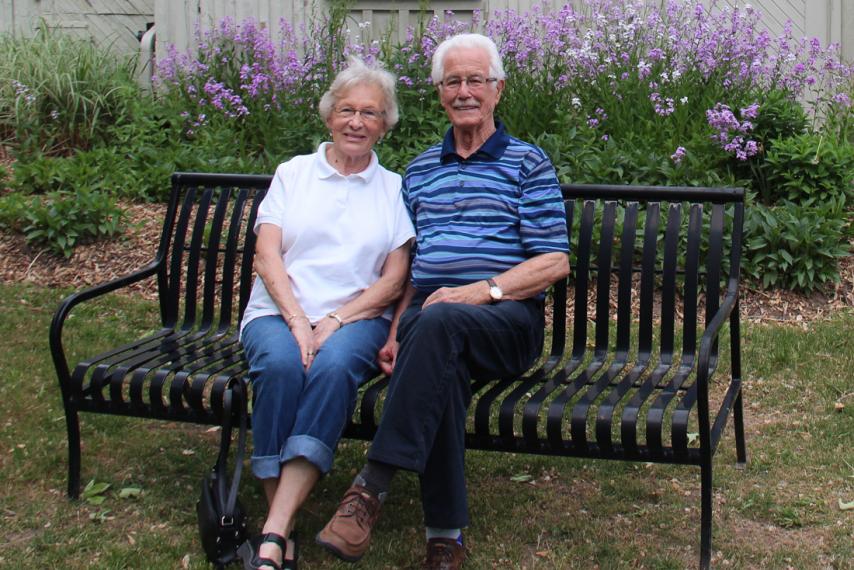The Maxwell Family: Investing in Agriculture

For some, farming is in their genes and every career path seems to always end up leading back to the land. Joe Maxwell comes from a long line of farmers who immigrated to Canada from England in 1854. He grew up working on his parents’ farm in Bruce County and in 1947 he left to attend the Ontario Agricultural College. By the time he graduated in 1951, he wanted to go his own way and had no desire to return to the farm.
Joe joined the team at Ralston Purina and for 23 years worked in the marketing and sales department. While at Purina he lived in Belleville and met his wife Barb, a local girl who worked in a law firm. Joe is quick to say that he and Barb are a team. “Whatever has been done by us, has been done by us. We’re part of a ‘We’ game. I could say ‘I, I, I’ but I would be ‘Lie, lie lying’,” he laughs. After 60 years of marriage, three children and one grandchild, it becomes apparent that this sense of teamwork underlies the Maxwell’s success in both family and business.
During his time at Purina, Joe and Barb started a sideline turkey business from the ground up; breeding, growing. “We started out processing the birds on a picnic table, with a plastic sheet on it in the backyard,” shares Barb.
In 1960, they rented a barn and house for $800 a year and in the first four months lost $5,000 to diseased stock. For the next six months they invested into clean birds and made $11,000. Joe is a firm believer in sticking with it and if “something is fundamentally viable – and if you buy it cheap enough, you can surely be successful.”
By 1973 the Maxwell’s began to expand and bought several properties over the next 15 years. In 1988 they owned five farms with a manager in each location, although the Maxwell’s “never lived on any of the farms, we always lived in Leamington,” Barb says. The following year, Joe left Ralston Purina and committed his entire family to the turkey business.
For many years they used a small plant that resided on one of the farms for processing under a provincial license. But in 1999 it suffered severe damage from a fire. They turned this into an opportunity for growth and secured a federally approved plant with a HACCP license so they could sell to any market in the world. There weren’t many family owned and operated processing businesses at this level and the Maxwell’s “tried to work around the giant’s feet and not under them.”
Joe and Barb were always very hands on, working in the plant and overseeing every detail of the company. All three of their children joined the business, with Drew an OAC ’84 grad running the breeder operation, Claire in charge of the finances and David running the plant.
In 2014 the Maxwell’s decided it was time to sell but their children are still working for the new buyers to ensure a smooth transition. With their new found retirement comes time for reflection. “You look at yourself, you reflect on who you were and where you went,” Joe explains. “When I attended the University of Guelph it represented a whole new world – it opened up all the avenues that came forth.” Barb’s family also is home to a few alumni with both her father and Aunt as grads.
These connections are why Joe and Barb have remained in contact with his classmates and the College for decades. He can’t remember when he and Barb started donating to the University, but they’ve given every year since.
They have shown generosity and leadership through Joe’s class as well. In 2001 the Class of 1951 celebrated their 50th anniversary. Joe set up a challenge donating $17,000 per year for three years and asked his classmates to donate an additional $34,000 per year for three years to create a $153,000 Leadership Fund.
In 2014, the Maxwell’s made a transformational gift to the University of Guelph, by assigning the University as the irrevocable beneficiary of their $500,000 life insurance policy. Joe has always been a great believer in people.
“A building will get built; I like the idea of investing in people. When it comes to education, I want students to leave the OAC ready to contribute to the agricultural industry,” he shares. “There is no Joe Maxwell one generation later. The next generation can’t start a business like I did. They’re going to need help.”
Joe is confident OAC grads will always have a job and the agricultural industry has a big role to play in growing the economy in the coming years. “I want the University of Guelph to lead. The challenge is to provide that leadership ahead of the private sector; get the research done that farmers need,” he explains. “We want our gift in the right hands and we want the OAC looking out for the next generation of leaders.”